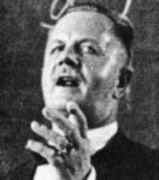Person: Mohr (2), Ernst

Ernst Max Mohr was a German mathematician who worked in the field of hydrodynamics, applied mathematics and differential equations, but also published on polynomials.
Mathematical Profile (Excerpt):
- After Mohr was awarded his doctorate he was appointed as assistant to Friedrich Karl Schmidt at Göttingen in the autumn of 1933.
- Weyl, who had been Mohr's supervisor, left Göttingen and in April 1934 the Ministry of Education confirmed the choice of Hasse as Weyl's successor.
- Mohr wanted an assistant position under Hasse, but he was aware that his present boss, Schmidt, did not think very highly of him.
- Certainly Schmidt became upset at Mohr's actions and Mohr now also opposed Hasse's appointment since he feared it would mean that no positions in Göttingen would be open to him.
- Mohr asked Carathéodory in July 1934 to write a reference to support his application to become Hasse's assistant but by this stage Tornier had forbidden Mohr from entering the Mathematics Institute at Göttingen.
- Mohr was forced to look for a post elsewhere and was appointed as a scientific fellow to the Technical University of Breslau on 1 November 1934.
- At Breslau Mohr changed areas and began to undertake work in hydrodynamics under the supervision of Johann Nikuradse.
- In 1940 Mohr published Über die Kräfte und Momente, welche Singularitäten auf eine stationäre Flüssigkeitsströmung übertragen Ⓣ(On the forces and moments which transmit singularities for a stationary liquid flow) concerned with the problem of the determination of the forces and couples which the stationary flow of an ideal incompressible fluid exerts on rigid bodies placed in its path.
- In 1942 Mohr was appointed to the German Charles University in Prague becoming an extraordinary professor in the following year.
- In Prague Mohr became friends with his colleagues Herbert Cremer and Feigl.
- On 12 May 1944 Mohr was arrested by the Gestapo while in the Hotel Béranek in Prague.
- It appears that Mohr was strongly opposed to the National Socialist regime which was in power in Germany but, like most people in a similar position, he was very careful not to say anything that might get back to the authorities.
- Mohr admitted only to listening to broadcasts by the BBC and argued in his defence that his research work was extremely valuable to the war effort, particularly to the German air force.
- Mohr's colleagues Johann Nikuradse and Hans Rohrbach argued that Mohr was too valuable to the German war effort to be put to death and his sentence was deferred for six months to allow him to be put, first into the Haftanstalt Meseritz concentration camp (at Miȩdzyrzecz in Poland), then into Plötzensee jail near Berlin, to do mathematical computations for developing the V (Vergeltungs) weapons programme.
- Not surprisingly the events of 1944 and 1945 caused a considerable publication gap in Mohr's record, with no publications appearing between 1944 and 1951, but he published five papers in 1951.
- Even after he retired Mohr continued to publish high quality papers.
Born 20 April 1910, Ebersbach an der Fils, Württemberg, Germany. Died 16 May 1989, Berlin, Germany.
View full biography at MacTutor
Tags relevant for this person:
Origin Germany
Thank you to the contributors under CC BY-SA 4.0! 

- Github:
-

- non-Github:
- @J-J-O'Connor
- @E-F-Robertson
References
Adapted from other CC BY-SA 4.0 Sources:
- O’Connor, John J; Robertson, Edmund F: MacTutor History of Mathematics Archive
